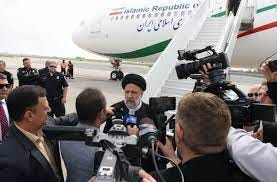Iran’s Raisi: We don’t want a repeat of the bitter experience of the past
Iranian President Ebrahim Raisi mostly deflected calls for diplomatic compromise to revive the nuclear deal in a meeting with the media in New York on Sept. 22.

If there is any diplomatic progress to be made with Iran, Iranian President Ebrahim Raisi signalled in a meeting with the western media in New York this week that he was not inclined to be the one to do it, at least insofar as it would involve the United States and the nuclear deal.
On his first trip as Iran’s president to address the opening session of the UN General Assembly, Raisi used the high-profile public platform to defend Iran’s positions, minimize western concerns about reduced monitoring of Iran’s nuclear program as the negotiations have dragged on, and blame the US for leaving the nuclear deal in the first place when, as he said, 15 IAEA reports had documented Iran had been complying with the deal, from 2016 thru 2019.
The 61 year old conservative cleric and former judiciary chief criticized the Biden administration for continuing to add new sanctions on Iran, and tried to articulate why Iran has staked out the positions it has on insisting that the IAEA safeguards probe be closed before reviving the nuclear pact. He explained why Iran is seeking guarantees; and why it is hard for Iran to make a deal with the United States which cannot promise that the next US administration will honor it.
“If we are going to be faced with a situation where the files remain open on an ongoing basis, so we are back to square one,” he sais. “We don’t want a repeat of the bitter experience of the past.”
If some of that caution was understandable, he did not seem to give much meaningful traction to questions that tried to explore possibilities for compromise, creative diplomacy, and crisis avoidance.
Asked for instance if Iran would turn IAEA cameras back on to increase transparency, Raisi somewhat bewilderingly said the cameras were still active.
“Thus far, the cameras have been active,” he said, referring to his UNGA address Wednesday in which he said 2% of the world’s nuclear activity occurs in Iran, but Iran accounts for 35% of IAEA attention.
The meeting with the media group started with a lengthy basically propaganda video, as apparently did a meeting Raisi had with a group of experts Wednesday night.
On questions about the protests that have erupted in Iran in response to the death in Iranian police custody of a twenty two year old Iranian woman, Mahsa Amini, Raisi said Iran has announced an official investigation, and they were releasing results slowly but surely. His answer on the findings to date seems unlikely to convince many who have taken to the streets.
“What has been thus far announced is there were no signs of beating or torture; all signs point to the determination that she was overcome by a heart attack or brain stroke,” he claimed, adding, “again, this is not the final determination.”
If Raisi is not inclined by temperament, ideology, or experience to spearhead more diplomatic compromise, there were glimpses of the presence of people in the Iranian delegation in NY who might be able to do that, including the foreign minister Hossein Amir-Abdollahian, deputy foreign minister and lead nuclear negotiator Ali Bagheri-Kani, and deputy foreign minister and former Iran ambassador to the IAEA Reza Najafi.
The question is not if this Iranian administration has the personnel who could reach possible technical and political solutions to close gaps to revive the nuclear deal, but if they will ultimately get the approval from a politically cautious Raisi and Supreme Leader Ayatollah Ali Khamenei to move forward on them.
Raisi’s public stance in New York suggested his comfort zone is in trying to preserve the status quo, even as that seems to be beleaguered on multiple fronts at home and abroad.
**
(written on a train, apologies for typoes, may post updated draft at the link later tonight.)
Update: In posting from the train, I inadvertently failed to include the part of the draft on Raisi’s comments about Iranian protests, re-added here.

